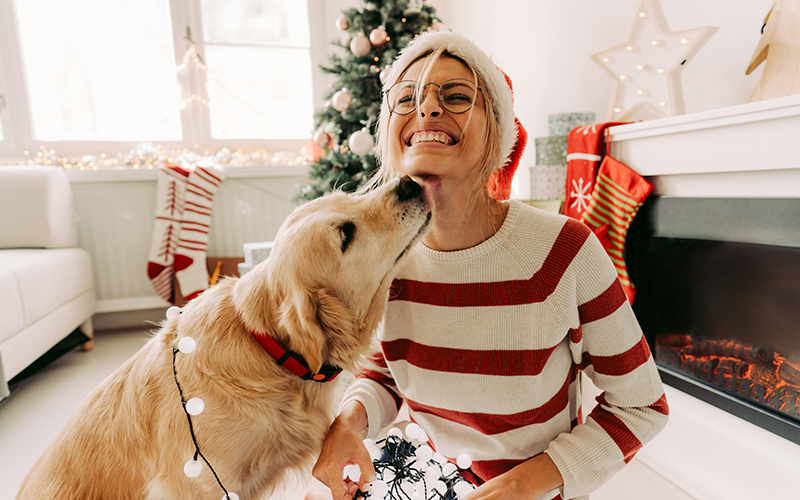As the holiday season approaches Christmas could look a little different for many people this year, amid concerns of COVID-19 surging after large indoor gatherings.
According to CNN, holiday travel plans are being called off for many people. Those people who typically travel over the holidays and board their pets, 2020 may be the first time they’re celebrating with their pets! And because pet adoptions are soaring during the COVID pandemic, the holidays with a pet underfoot is a first for many families. The companionship that comes along with pet adoption has brought many people joy and connection while being isolated from family and friends. But it’s important for new pet owners – or those who’ve never experienced the holidays with their pet – to be aware of some of the dangers that holiday decorations, food, and plants may pose.
Here are 5 tips to help keep your furry friends safe and happy this holiday season!
Pass on the plants
Many common holiday plants that beautify and brighten your home can be hazardous to your pet’s health. Holly berries and mistletoe can be toxic to pets. Ingesting large amounts of mistletoe can cause abnormal heart rate, collapse, low blood pressure, seizures, and death. Holly contains saponins which cause gastrointestinal upset (vomiting and diarrhea) and the spiny leaves can cause injury to the stomach. Lilies are popular in floral arrangements but are extremely toxic to cats. Exposure to any part of the plant – even the water in the vase – causes kidney failure in cats. Amaryllis bulbs are a common holiday gift, but be aware that consumption of the bulbs, leaves, and stems can cause vomiting, low blood pressure, and respiratory depression. While poinsettias have a bad rap for being toxic, the fact is that they’re not very toxic at all! If pets are exposed to the milky sap, they may develop some skin irritation and if ingested, they may drool or vomit.
Tether the tree!
Some pets just can’t help themselves and will try to scale a Christmas tree to get a closer look at the glittery ornaments or twinkling lights, or find a good perch to look out the window. If the tree isn’t secure, it could come crashing down as your pet scales the trunk, damaging your ornaments, making a giant mess, or worse yet, injuring your cat. Avoid decorating the lower part of your tree to prevent curious cats and dogs from batting or chewing on glass balls, ornaments, and lights. Don’t use tinsel on your tree – if ingested by a pet, it can cause a serious surgical condition called a linear foreign object. Many animals like to chew on electrical cords which can result in burns or electrocution. Keep cords tucked away and keep your pets away from the tree.
Stash the sweets and treats
Treats sweetened with xylitol can be especially dangerous for dogs. Xylitol can be found in a variety of products including sugarless gum and candies, as well as peanut butter, toothpaste, lotions, facial products, deodorant, and skin gels. Even consuming small amounts can cause low blood sugar and liver failure. If your pet ingests any product containing xylitol, contact your veterinarian immediately. While hot cocoa can be a nice festive treat on cold snowy days, keep this beverage away from your pets. Chocolate contains theobromine and caffeine and ingesting just 2-3 ounces of dark chocolate can make a 50-pound dog very sick, causing vomiting, diarrhea, elevated heart rate, tremors, seizures, and even death. Call your veterinarian immediately if your pet has ingested chocolate.
Cap the candles and mind the fire
Kinaras, menorahs, and festive candles are an important part of holiday traditions. Never leave candles unattended; it only takes one flick or wag of a tail to topple a candle. Singed hair, burns, and fires are preventable. Consider using battery-powered candles and if you do use real candles be sure they’re out of reach of pets and extinguished after use. Fires – both traditional wood-burning and gas fireplaces – create a charming ambience, but pets can get burned or singed. Pets may be drawn to rest near a fire to get some extra warmth on cool damp days. Supervise your pet, train him to stay away, use a fireplace screen for added protection, and keep pet beds away from the hearth to prevent burns and fires.
Tuck away the turkey…and the trash!
Including your pet in your festive meal is tempting, but serious gastrointestinal upset with a sudden change in diet can occur. Rich fatty foods not only can cause vomiting and diarrhea, they can also cause a serious and painful condition called pancreatitis. Cooked turkey bones are brittle and can cause injuries to the mouth and throat, choking, obstruction (blockage) of the throat or gastrointestinal tract, and rectal bleeding from sharp bone pieces. When cleaning up after your delicious festive meal, make sure that the garbage is inaccessible to your pets. Tasty strings used in tying the turkey, juices in foil pans, plastic wrap with chocolate icing can be tempting for curious pets.
Being mindful a few safety measures can prevent illness and emergency trips to your veterinarian over the holidays. Happy holidays to everyone in your home!
Download the kit






